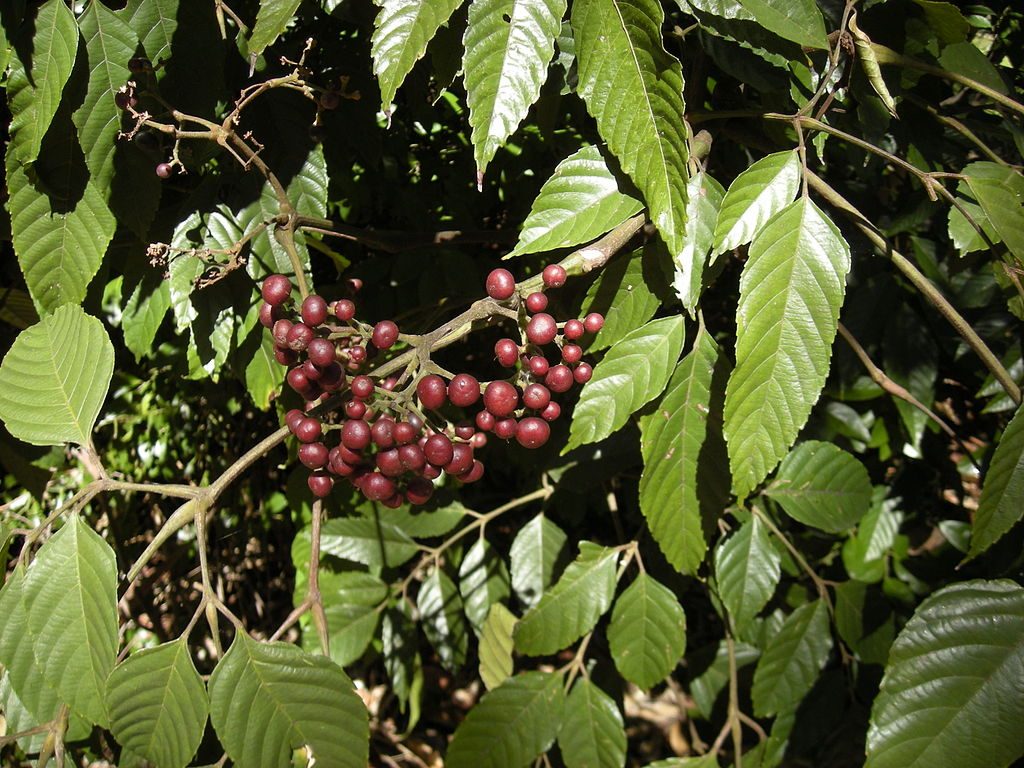 Bandicoot Berry (Leea indica) is a large shrub that belongs to the Vitaceae (grape) family of plants. Bandicoot berry is evergreen, and native to tropical Asia and Australia. Bandicoot berry leaves and root extracts are used in traditional medicine as a tonic for a number of ailments including skin diseases, vertigo and headache. Studies show strong antioxidant and antimicrobial effects for extracts of bandicoot berry. In addition, there is evidence that extracts of the plant may be useful in the treatment of insomnia and anxiety. For example, in one study researchers investigated the sedative and anxiolytic effects of bandicoot berry in mice. The results showed that leaf extracts of bandicoot berry significantly decreased the anxiety of the mice when exposed to experimental stress. There was also evidence that the leaf extracts of bandicoot berry caused a sedative effect in the mice by prolonging the sleep time induced through administration of the barbiturate sedative drug thiobarbital.
Bandicoot Berry (Leea indica) is a large shrub that belongs to the Vitaceae (grape) family of plants. Bandicoot berry is evergreen, and native to tropical Asia and Australia. Bandicoot berry leaves and root extracts are used in traditional medicine as a tonic for a number of ailments including skin diseases, vertigo and headache. Studies show strong antioxidant and antimicrobial effects for extracts of bandicoot berry. In addition, there is evidence that extracts of the plant may be useful in the treatment of insomnia and anxiety. For example, in one study researchers investigated the sedative and anxiolytic effects of bandicoot berry in mice. The results showed that leaf extracts of bandicoot berry significantly decreased the anxiety of the mice when exposed to experimental stress. There was also evidence that the leaf extracts of bandicoot berry caused a sedative effect in the mice by prolonging the sleep time induced through administration of the barbiturate sedative drug thiobarbital.

Studies have investigated the phytochemical composition of bandicoot berry (Leea indica) (pictured). Compounds identified include hydrocarbons, phthalic acid and its esters, gallic acid, lupeol, β-sitosterol and ursolic acid. The flowers of bandicoot have also been analysed chemically. Essential oils extracted from bandicoot berry leaves are comprised mainly of phthalic acid esters (95 %). These chemicals may therefore contribute to the anxiolytic and sedative effects of bandicoot berry. In particular, gallic acid has been shown to possess antianxiety effects in mice. In this respect, gallic acid has been shown to induce antianxiety effect in both stressed and unstressed mice. Gallic acid also significantly decreased the amount of circulating stress hormones observed in the mice, suggesting that gallic acid can modulate stress. These effects of gallic acid may be through inhibition of the nitric oxide synthase enzyme, and reductions in nitric oxide in nervous tissue. Nitric oxide is thought to function as a neurotransmitter in nervous tissue, and its inhibition may alter neuronal activity, inducing a calming effect. Image by Ethel Aardvark (Own work) [CC BY 3.0 (http://creativecommons.org/ licenses/by/3.0)], via Wikimedia Commons.
Eat Well, Stay Healthy, Protect Yourself
RdB
